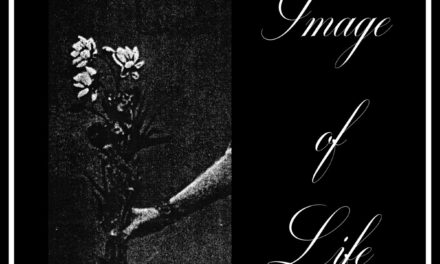Rome
A Passage To Rhodesia
Trisol
You can’t accuse Rome of intellectual laziness. While many of the neo-folk contemporaries that Jerome Reuter has been showing up for the past decade have used the gravitas of war to imbue their songs with stridency and false nobility, long on vagueries and short on content, the Luxembourg based singer and songwriter has always approached accounts of 20th Century conflict as a historian and a storyteller. Rome’s albums are consequently often quite literal, past topics having included the Spanish Civil War (Flowers from Exile) and the French Resistance (Nos Chants Perdus), with Reuter exploring their tragedy and human cost in ever more intricately constructed combinations of acoustic instrumentation and digital textures. If any of that sounds like it might be a touch conceptual for your taste, lay your fears to rest; perhaps Reuter’s greatest strength as a songwriter is the ability to render those heady ideas into songs you would actually want to listen to.
That Reuter’s latest album is a double-LP about the Rhodesian Bush War isn’t necessarily a surprise, although his approach to the material is distinctly different than any previous Rome album. At a basic structural level the album is divided into one disc of acoustic folk structures, augmented by the light brushes of symphonic arrangements and echoing martial percussion which should be familiar to those who’ve tracked the last four or so Rome records. The second half enters into more unfamiliar territory, with murky morasses of noise shifting in and out of focus with grainy recordings of speeches and news reports covering the conflict. This binary structure, in retrospect, was directly pointed to on pre-release EP Hate Us And See If We Mind, but the capacity it has to portray the conflicts which Reuter fixates upon in two different lights (one personal, one historical) was something we couldn’t have foreseen.
It’s in the “personal” side of that equation that A Passage to Rhodesia marks Reuter’s most ambitious break with his own modus operandi, even in songs which are not especially sonically different from those which came before. In the lengthy conflict between multiple revolutionary factions seeking independent rule from the commonwealth and the white settlers, it’s the latter group that Reuter has chosen to directly address and adopt the voice of. In some senses it’s the only option that makes sense for Jerome as a narrator. As sensitive as he may be to the nuances and subtleties of the conflict he is more uniquely suited to address the European faction and their struggle to keep their foothold in Africa even as the tides of time pushed them further onto the wrong side of history. That said, it’s still sticky territory for a decidedly leftist artist: can you have empathy for the imperialist settlers unwilling to cede their grasp on a country settled by force? Would you even want to?
The answer to that question is complicated, and lies in the way Rhodesia is addressed in the first half of A Passage to Rhodesia. The songs that make up the “folk” portion of the album all treat the country in its pre-liberation form as an ideal, a dream in the hearts of settlers who are entirely deaf to the reality of their role as oppressors. In that sense the album is really about its protagonists’ inability to understand the truth of their surroundings, and positions that ignorance as their greatest spiritual and moral failing. As Reuter sings “We’ve all but conquered fate/so hate us and see if we mind” on the song of the same name, that hubris comes into sharp focus. That mistaken feeling of virtue is reinforced in early numbers like the forceful “One Fire”, where the subjugation inherent in colonial rule is characterized as a bitter destiny manifested, only just in the eyes of the occupier.
It’s tricky stuff to address, and while Reuter shows some empathy with the governing forces who are fighting for a lost cause they can’t possibly understand the greater historical context of, he’s equally critical of the dream of Rhodesia as a white paradise built on subjection. Even on the spoken word piece “The River Eternal” and the following “A Country Denied” the attitude of the settlers is portrayed as a one-sided tragedy, unable to comprehend the rejection of what they believed to be their god given right to rule. They’re sad songs, but the Rhodesia they mourn for is portrayed as having never existed, its borders drawn in blindness and erased by the harsh reality of a bloody civil war. The grim realization is driven home on “Lullaby for Georgie”, where the idea of the nation is eulogized, the lament shot through with sudden realization, with Reuter as narrator asking “Were you ever mine?” as if the idea had never occurred to him before that singular moment.
This focus on shame and regret makes for fraught listening, to be certain. “When did we know we were on the wrong side?” is a question we can’t imagine many martial-themed artists honestly asking within the framework of whichever obscure national battalion they choose to dedicate their albums to (see also the questioning Reuter’s done of his own goals in recounting wars which are not his own). But if the first disc of A Passage to Rhodesia finds the colonizers spinning in their graves, unable to settle their accounts with their own souls, the final word is given over to the more impassive eye of history. As the dream of a colonial paradise fades, documentary voices emerge, reciting Rhodesia’s Unilateral Declaration of Independence, condemnations and accounts of guerrilla attacks on civilians, and other fragments of history. Archival recordings of hymns, military marches, and regional folk music intertwine with Reuter’s own blurred and smothering industrial soundscapes. This is not entirely dissimilar from his earliest work on Berlin and Nera, but while there was a feel of roaming sonic exploration for its own sake on those records, there’s no such vigor on these pieces, which remain utterly fixed to the history and the dead they connote.
So once again, Reuter’s found a new direction in which to sail his steely juggernaut of unblinking reflection and balladeering. We speculated that the acerbic and self-damning Hell Money might have had such a quick gestation due to its cathartic designs; here Reuter’s wisely taken the opposing path in recounting a story which is distinctly not his, taking the time to formulate a structure that pays respect to the gravity of the conflict he’s recounting, while latching on to the theme of the feckless colonist slowly realizing the cost and futility of his dream of an idle paradise. Unique, bracing, and strongly recommended.







Solid review, gentlemen.
Thank you!
Very nice review yet Rome’s songs are only superficially about some past wars, they have a much deeper meaning for today.
Am I crazy for hearing “Ballad of the Red Flame Lily” as a potential hip-hop crossover?
I have ordered it.
As someone who lived through the experience, I will raise a few points.
1. There was a media blackout, which meant that since UDI was declared no alternative points of view to that of the Rhodesian Front appeared in the papers.
2. The country was time-locked in a post world war two attitude, where doing your duty and going to war were still part of the mindset of the white population.
3. The whites were also divided into separate roles and separate mental states. Men knew about war, but women didn’t, especially if they were living in the suburbs rather than the outlying areas. Children were also protected by the 19th Century Victorian dictum that they ought to remain innocent of knowledge of violence. Ideally, only the men knew of it and only the men were exposed to it, not the women or children.
4. Nineteenth Century Darwinism was also prevalent as an explanation for “race”.
5. The majority of soldiers on call up had more of a Leave it to Beaver mentality than a right-wing fascist one.
6. Emotional repression is one of the major reasons why most ex-Rhodesians do not speak of their woes. They’ve never learned to do so. They were more stiff upper-lipped than the notorious British aristocracy.
7. The division between white parents and white children was often as extreme as that between blacks and whites. See: White Man Black War: Bruce Moore-King
It is not accurate to lump all the whites in togther, as our differences were generational.
8. The majority of Rhodesians were not particularly wealthy, but got around in very old cars, and made do with very old equipment of all sorts and hand downs.
9. There was a wealthy industrial elite in Rhodesia, but they got all their money out of the country before collapse and take-over. It was only the really earnest everyday Rhodie who was sold a bill of goods, because he had been subjected to a media blackout and thought he was on the side of God and right and that the war was winnable.
10. I’ve written my own book about the aftermath of the war and the intergenerational conflict.
Thank you for your eloquent defense of Rhodesians. Musically it’s a good album, but that is all.. Perhaps Reuter should’ve called it passage to Zimbabwe, because if the Rhodesians were living in a dream world, the Zimbabweans are in utopia, ja?
Thank you for your explanation in that points. For me how a Brazillian guy is very hard undestand the psycology behind about the motivation to join in tha war in these conditions. No there are much informations about that wor in the web as well. I visited your channel interesting videos there as well.
I think looking historically, the best solution was scuttled by the communist-backed terrorists that went on to control and squander Zimbabwe. A moderate government with qualified voting would almost certainly be majority ruled by the turn of the 21st century and would have avoided the central planning issues leading to famine as experienced by Zimbabwe. The world had a chance to see a “rainbow nation” appear that really was best for all but was instead focused on pushing equally racist policies of land theft based on race. All of history is nuanced and I can see from your comment where your bias lies, but I think everyone can agree the optimal outcome did not appear.
It is now the year 2017. Today is Martin Luther King Day. In four more days, Trump will be president. For some reason, I found myself idly flipping through the booklet from “A Passage to Rhodesia”, when one paragraph jumped out at me:
“If we look upon that which is today qualified as the Whites’ ‘ignorance’, we must see that it was an ignorance born of distance rather than an innate racism or idiocy. For all their sins, most White Rhodesians were not racist thugs or heartless beings, even though, undoubtedly, their system institutionalized discrimination and exploitation… Their society, however, stood for principles which critical outsiders saw as racial or class privilege and was composed of people whose common interest was a good material existence. Most of them were ordinary, decent folk who never dreamed beyond their immediate happiness.”
I felt an eerie chill as I read these words. Are I and my fellow Americans experiencing a passage to Rhodesia of our own?